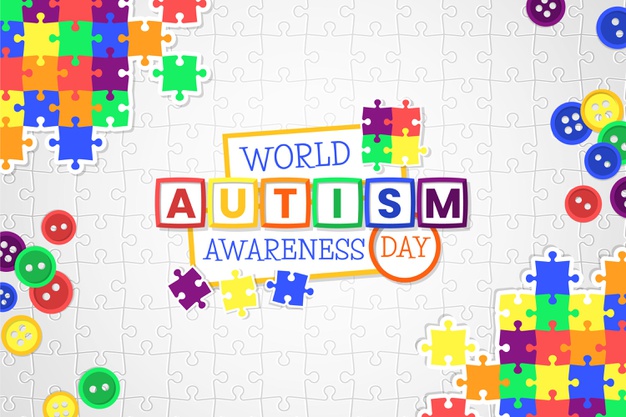Autism has no known cure. However, early medical and behavioral intervention can add to the healthy growth of an autistic child.
Autism, or autism spectrum disorder (ASD), is a complicated condition that affects the speech, social behavior, and learning abilities of the affected. Generally observed among children below ten, Autism can be acquired at any age. Autism is common in India with over 1 million cases registered annually. Here are some of the Autism facts-
- Autism runs in families, though the hereditary inheritance pattern is unknown.
- One’s risk level of Autism is unaffected by socio-economic factors like education, income, employment, environmental exposure, and health behavior.
- Boys are four times more at risk to contract Autism than girls.
- The age of the parents is also a risk factor. Kids of older parents carry a higher risk of developing Autism.
- Expectant mothers are more prone to have autistic children when exposed to medications, alcohol, or anti-seizure medications.
To raise awareness about Autism, how it affects the developmental growth of children, its signs and symptoms; the World Autism Awareness Day 2021 is observed worldwide o the 2nd of April every year.
Factors that affect the onset of Autism (ASD)
Pre-existing co-morbidities like gastrointestinal (GI) disorders, seizures, anxiety, depression, sleep disorders add to the risk of contracting Autism. Autistic people face attention issues and have difficulty with learning. Their abilities may develop unevenly. For instance, though they may have communication challenges but may succeed in arts, music, or math. Consequently, they may perform exceptionally well on analytical or problem-solving tests.
Detecting early signs of Autism
The early signs of Autism vary widely. Some infants affected by Autism may show signs and symptoms in their first months. However, Autism behaviors become obvious as late as a child is two or three years of age.
The table below explains the probability of a child developing autism spectrum disorder (ASD) as they grow-
| Age of the Child | Autism Signs and Symptoms |
| By 6 months | Fewer or no big smiles.Restricted expressions.No eye contact. |
| By 9 months | Limited understanding of sounds, and facial expressions. |
| By 12 months | Limited or no babbling, back and forth gestures like waving or pointing.No response to name. |
| By 16 months | Limited comprehension of words and familiar faces. |
| By 24 months | Not able to speak any meaningful, two-word phrases. |
| At any age | Loss of previously acquired social skills and speech. No eye-contact.Preference for solitude.Not able to understand other people’s feelings. Slow down / retarded language development. Repetition of words and phrases (echolalia).Not able to adjust to minor changes in routine or surroundings. Limited interests. Repetitious actions like spinning, rocking, etc. Extreme response to lights, sounds, or smells. |
Different types of Autism
Autism spectrum disorders can range from-
- Asperger’s syndrome: Children suffering from Asperger’s don’t show any language problems and perform average or above average in intelligence tests. However, they struggle with social issues and have a limited range of interests.
- Autistic disorder: Occurs in children under three years of age. Symptoms include difficulties with social interactions and communication.
- Childhood disintegrative disorder (CDD): Children with CDD experience normal growth and development for about two years before showing signs of restricted communication and social skills.
- Pervasive developmental disorder (PDD)– Also known as atypical autism, symptoms and signs include delays in social and communication skills observed in children below three years of age.
Autism Screening and Diagnosis
Autism screening and diagnosis can be challenging. A specialist doctor would focus on studying behavior and developmental signs to diagnose the different types of Autism as discussed above. Diagnosis and medication plan for children usually consists of the following steps-
- Initial developmental screening with a Paediatrician on the Gigadocs app would ascertain whether your child is aligned with their growth goals of learning, speaking, behavior, and moving in accordance with their age. Experts suggest additional screening for developmental delays during a child’s regular check-up at 9 months, 18 months, and 24 or 30 months. Children are routinely checked specifically for autism at their 18-month and 24-month check-ups.
- Your child would need a complete evaluation if they show signs of developmental delays in the above-discussed screenings. These screenings might include Autism Diagnostic Observation Schedule (ADOS) test, hearing and vision tests, or genetic tests. Consult doctors on the Gigadocs e-Healthcare app specializing in autism disorders, like a developmental Paediatrician or a child psychologist.
- Behavioral and communication therapies like Applied Behaviour Analysis (ABA), which encourages positive behavior while discouraging negative behavior, are of great help to mitigate Autism risk factors. Occupational therapy can help to strengthen life skills like dressing, eating, and social interactions.
- Sensory integration therapy may benefit someone sensitive to touch, sights, or sounds. While speech therapy helps to improve communication skills.
Autism care with Gigadocs
No parent wants to suspect symptoms of Autism in their child. However, it is equally important to look at the warning signs for an early diagnosis and effective treatment. Early diagnosis of Autism is critical. Medications and therapies can help increase the chances of a higher quality of life for your child.
Gigadocs app brings together developmental pediatricians, pediatric neurologists, child clinical psychologists, audiologists (hearing specialists) for in-depth medical examination of your child for Autism and developmental delays.
Download the Gigadocs app for your child’s safe consultation from the privacy of your home with the best pediatrician for your child over a call or a virtual appointment on the Gigadocs app.
Download Gigadocs app from-
- IOS App – apple.co/2W2iG4V
- Android App – bit.ly/33AQoRC
To know more and schedule a Virtual Consultation demo, Email, at info@gigadocs.com.




